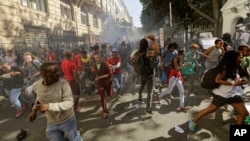Fourteen South African universities have temporarily closed amid a wave of student protests over proposed tuition and fee hikes, including one protest Wednesday that led to a clash between students and police outside Parliament in Cape Town.
The protests started last week at Johannesburg’s University of the Witwatersrand over a proposed 10 percent increase. Since then, the Twitter hashtag #feesmust fall has spread across social media platforms, and protests have occurred at such diverse institutions as the elite University of Cape Town, the small, liberal Rhodes University, and the rural Fort Hare University.
The protests have spurred university leaders to meet this week with Higher Education and Training Minister Blade Nzimande to try to work out a compromise. The group proposed that increases be capped at 6 percent, an offer that student leaders rejected. They demanded no increase at all.
Legacy of apartheid
Observers say the clashes over college costs is rooted in something that happened before many of today's students were born. South Africa’s system of apartheid, which among other things denied black South Africans equal education and opportunities, produced racial inequality that persists to this day.
The average undergraduate at the University of the Witwatersrand is paying just less than $3,000 in tuition this year. The last South African census found white households earn, on average, six times what the average black family earns, meaning tuition payments can be a much heavier burden for some families than for others.
The ruling African National Congress party has noted this and has supported the call for lower fees.
“The call for fees to fall in higher education institutions in our country is one that must be supported by all South Africans,” the party said in a statement. “For far too long, affordability has been a tool of exclusion, violating the rights of many, particularly black children, to education as enshrined in the Bill of Rights.”
But the ANC acknowledges that the government has not been able to do enough for South Africa’s students. In recent years, as demand for university education has grown, inflation has risen, and so have education costs. South African universities have seen budget cuts nearly across the board, but the government has said it does not have the money to make up the difference.
Earlier this month, Nzimande told academics, “We are competing for funds with a whole range of very serious and pressing priorities: health, basic education, housing, infrastructure. ... I acknowledge that although the subsidy for universities has increased, it has not kept pace with inflation.”
So the burden has fallen to students, as the government and universities accuse each other of not doing enough.
Following the money
The real blame, the government’s critics say, rests with corrupt officials.
The National Student Financial Aid Scheme has been under investigation for fraud, corruption, maladministration and collusion.
Meanwhile, corruption scandals seemingly erupt weekly, though none have come close in scope to accusations that President Jacob Zuma spent nearly $25 million of government money to upgrade his private homestead. Those upgrades, which he said were done in the name of presidential security, included a chicken run, a cattle enclosure, an amphitheater and a swimming pool, dubbed a “fire pool” for its utility in fighting fires.
“The ANC government is the number one stumbling block in the attainment of a fee-free university,” said Mbuyiseni Ndlozi, spokesman for the Economic Freedom Fighters party, a far-left, youth-oriented party that has challenged the ANC in Parliament over the tuition issue.
Reconciliation, forgiveness
Many universities, including the University of the Witwatersrand, have been forced to suspend classes while protests continue. But eventually, a solution will have to be negotiated, and there is evidence the wounds of the past are slowly healing.
Jonathan Jansen, the black vice chancellor at the formerly all-white University of the Free State, another institution that has seen protests this week, has been praised for bringing harmony to a once-divided institution. This week, he commented on his Facebook page that there is a problem with college costs, but that the fractious nature of the protests isn't helping.
"There are two issues at stake in student protests over fees: the real problem of poor students not being able to afford higher education (that is a legitimate complaint) and the real problem of how university leaders pay the bills without collapsing the institution," he said. "Neither is the enemy here; the problem cannot be resolved through antagonism between these two groups."




